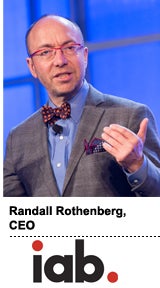 The crowd at the IAB’s Annual Leadership Meeting looked about the same as ever – composed of many publishers and tech companies – but with one big difference from last year. As of September, tech companies are now voting members of the IAB.
The crowd at the IAB’s Annual Leadership Meeting looked about the same as ever – composed of many publishers and tech companies – but with one big difference from last year. As of September, tech companies are now voting members of the IAB.
Some at the meeting barely registered the change, since tech companies have long been involved in meetings and committees (as non-voting members). IAB CEO Randall Rothenberg talked to AdExchanger about the membership change and what it means for the IAB’s priorities.
AdExchanger: What was behind the decision to bring companies who sell, deliver or optimize media into the fold?
RANDALL ROTHENBERG: For all the years I’ve been at IAB, there had been this tension between tech companies and content companies. Whenever we raised the idea of expanding membership criteria, it was always unanimously no. Google, New York Times, Yahoo, AOL – they would always agree.
But 18-24 months ago, I detected a significant change in peoples’ attitudes. First, pretty much every publisher finally realized that it was in the technology business too and had to master advertising technology and content technology.
Second, they realized their business partnerships had changed. All of them were going to partner with one or more tech companies, working with companies like Rubicon, PubMatic, AppNexus. They were no longer just competitors; they’re collaborators, or co-opetition. There was this growing recognition that we’re all in the same business, and need to be in same room making decisions together.
What are the benefits for the membership base?
Before, all [technology] companies were associate members, participating actively in committees, councils, task forces, but what general membership allows is to serve on the board of directors, chair councils and allow different sets of intelligences to lead discussions and take leadership roles. It makes for a richer, deeper conversations and better standards and business processes.
How does the Tech Lab – announced at the same time – fit into the decision to make tech companies voting members?
The real heavy lifting is there. It’s getting companies from outside the US involved, so we can create standards around the world from the get-go.
In the past, we created an IAB standard in the US, and then gradually rolled it out around the world. We can’t afford to have slow, serial rollout anymore. We’re looking at planning on a global basis, and we need to have other countries in the room, so they’re able to adopt and implement standards. It won’t be quick, but it will be important. We want the top two to three media or tech companies in any given national market to be parts of the Tech Lab, so they will be able to lead the charge in forming the standard.
But the idea is to keep the politics discreet, and avoid what happened to the W3C [World Wide Web Consortium], an intensely politicized body, where the politics has superseded the ability to create smooth operating standards within the Internet.
What’s your role in native advertising?
The old-fashioned IAB mandate, which is helping the market understand and coalesce around best practices and technical standards. Those best practices are fairly well-established, like not fooling consumers. That’s also an important business consideration, because the worst thing you can do as marketer is sacrifice credibility because you’ve fooled consumers.
We’ve been aggressive about acting as an educational medium for members, regarding the legal requirements and regulatory requirements. On the other side of the coin, we’re always communicating to the FTC when we think they’re going too far, and doing things that don’t have a basis in well-founded law and regulation.
A few years ago, they completely overstepped. The so-called blogger rules, the endorsements and testimonials guidelines, created a separate set of constraints on digital media and journalists that didn’t apply to print or TV journalists. We called it out, said it has no legal basis. Under the rules they were promulgating, a book review blogger who received a copy of book for free and reviewed it in blog could be subject to civil penalty, and that didn’t apply to newspapers. It was ludicrous.
What are the revenue stressors and opportunities for publishers out there?
The biggest is the classic supply and demand. There are a lot of new media properties out there, and more and more marketers are willing to use them. That puts pressure on traditional owners of supply, and lowers prices; it’s economics 101. Another problem is the lack of liquidity in programmatic.













